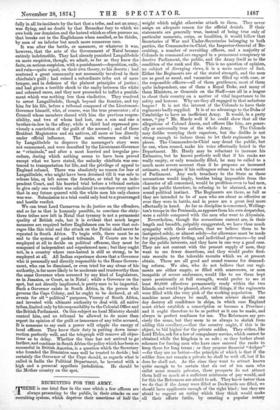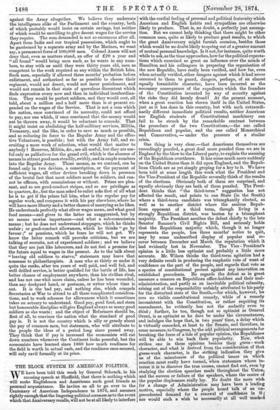RECR17ITING FOR 1 aka ARMY.
IMIERE is one fatal flaw in the case which a few officers are always presenting to the public, in their attacks on our recruiting system, which deprives their assertions of half the
weight which might otherwise attach to them. They never assign an adequate reason for the official denials. If their statements are generally true, instead of being true only of particular moments, corps, or localities, it would follow that Secretaries of War and Under-Secretaries belonging to both parties, the Commander-in-Chief, the Inspector-General of Re- cruiting, a number of recruiting officers, and a majority of Colonels in command are engaged in a permanent conspiracy to deceive Parliament, the public, and the Army itself as to the condition of the rank and file. This is no question of opinion, no subject of diverging views, it is a mere matter of fact. Either the Regiments are of the stated strength, and the men are as good as usual, and vacancies are filled up with ease, or the responsible officers—all of them gentlemen, most of them quite independent, one of them a Royal Duke, and many of them Ministers, or Generals on the Staff—are all in a league to cheat their country on a matter of vital importance to its safety and honour. Why are they all engaged in that nefarious league ? It is not the interest of the Colonels to have their regiments badly supplied. It is of no advantage to the Duke of Cambridge to have an inefficient Army. It would, in a party sense, " pay " Mr. Hardy well if he could show that all the allegations of Colonel Anson, and officers like him, are gener- ally or universally true of the whole Army. The Colonels may dislike worrying their superiors, but the dislike is not strong enough to induce them to let their regiments go to pieces. The Commander-in-Chief may dread the public, but he can, when roused, make his voice effectually heard in the Department. Mr. Hardy may be reluctant to increase his Estimates, but he knows perfectly well that if his ranks are really empty, or only nominally filled, he may be called to a much more severe account than if he proposes an increased estimate, and resigns if his colleagues refuse to ask the consent of Parliament. Any such treachery to the State as these accusations would imply, besides being impossible from the character of all concerned, would be profitless even to bad men, and the public therefore, in refusing to be alarmed, acts on a sound political instinct. The Regiments are there, as full as they are intended to be of men who are about as effective as ever they were in battle, and in peace are a great deal more effectually in hand. As far as discipline is concerned, Welling- ton's troops in the Peninsula, as appears from his own despatches, were a rabble compared with the men who went to Abyssinia.
Nevertheless, though the accusations current are, in their length and breadth, palpably exaggerated, we have thus much sympathy with their authors, that we believe them to be instigated solely, or almost solely—for allowance must be made for prejudice, party feeling, and individual grievances—by zeal for the public interests, and they have in one way a good case. They are not content with the present supply of men, they want to see fewer desertions, and they would prefer first- rate recruits to the tolerable recruits which we at present obtain. Those are all good and sound reasons for demand- ing reform. We also, who do not believe that our regi- ments are either empty, or filled with scarecrows, or men incapable of severe endurance, would like to see them kept more persistently at full strength, would prefer to see at least 80,000 effectives permanently ready within the two Islands, and would be pleased, above all things, if the regiments were filled with the very pick of the working population. The machine must always be small, unless science should one day destroy all confidence in ships, in which case England must either establish a conscription or become a Province ; and it ought therefore to be as perfect as it can be made, and always in perfect readiness for use. The Reformers say pre- cisely the same, but they seem to us always to shrink from adding this corollary,—that the country ought, if this is its object, to bid higher for the private soldier. They either, like Lord Elcho, ask for a law of compulsory service, which cannot be obtained while the kingdom is so safe ; or they bother about schemes for forcing men who have once entered the ranks to keep there for long terms ; or they propose financial "dodges" —for they are no better—the principle of which is that if the soldier does not remain a private he shall be well off, but if he does he shall not. As the class they want to attract knows quite enough to be certain that six out of ten men who enlist must remain privates, these prospects do not attract them half so much as a sufficient minimum of pay would, and for this the Reformers are afraid to ask. They know better than we do that if the Army were filled as Dockyards are filled, we should have applicants enough of the right kind ; but they are afraid to suggest an outlay which they think would make all their efforts futile, by creating a popular outcry
against the Army altogether. We believe they underrate the intelligence alike of the Parliament and the country, both of which probably would insist on certain savings, but neither of which would be unwilling to give decent wages for the service • they require. The sum demanded is not so enormous after all. Apart from India and our tropical possessions, which ought to be gairisoned by a separate army and by the Marines, we want say, a permanent force of 100,000 men. Colonel Anson will not
deny that, even as matters stand, an offer of £20 a year and "all found" would bring men such_ as he wants in any num- bers, to stay with ne until they were thirty years old, men as
competent to the work required as any within the British Isles.
Such men, especially if allowed three months' probation before enlistment, and authorised as far as possible to choose their
regiment, would not desert, would not incur punishment, and would not remain in that state of querulous discontent which finds expression every now and then in individual insubordina- tion. They would be perfect soldiers, and they would cost, all told, about a million and a half more than is at present ex- pended on the wages of the Service. That is not a sum which the nation, once convinced of its necessity, could not afford to pay, nor one which, if once convinced that the money would not be thrown away, it would be reluctant to concede. That it might insist on abolishing the half-military services, Militia, Yeomanry, and the like, in order to save as much as possible, and so reducing its force to the Regular Army and the effec- tive Volunteers, is possible ; but with the Army full, and re- eraiting a mere work of selection, what would that matter to anybody? Reserves, Militia, &c., are all useful, but they are use- ful only as palliatives for the grand evil, which is thaabsence of means to attract good men steadily, swiftly, and in ample numbers into the Regular Army. Those means, as we contend, can be found only in two devices, a conscription, or the payment of sufficient wages, all other devices breaking down in presence of the brutal fact that most soldiers must be soldiers, and can- not be officers, with commissions or without. Prizes are plea- sant, and so are good-conduct stripes, and so are privileges as to quarters, &c., but the man asked to enlist asks first of all what he is to get if the prizes fail him, what is the regular pay for regular work, and compares it with his pay elsewhere, where he will have more liberty and a better chance of marrying as he likes. He understands perfectly what silver wages mean, and what good food means—and gives to the latter an exaggerated, but by no means unwise importance—and what a sub-commission means ; but he does not understand stoppages, which he thinks unfair; or good-conduct allowances, which he thinks "go by favour ;" or pensions, which he fears he will not get. We know the latter remark will provoke criticism, but we are _ta]king of recruits, not of experienced soldiers ; and we believe that they are just like labourers, and do not feel a promise for the future equal to wages in the present. As to the talk about "leaving old soldiers to starve," statesmen may leave that nonsense to philanthropists. A man who at thirty or under it quits the ranks, after ten years of well paid, and well fed, and well drilled service, is better qualified for the battle of life, has better chance of employment anywhere, than his civilian rival, and has not one whit more claim, unless he has been wounded, than any dockyard hand, or postman, or writer whose time is out. It is the bad pay, and nothing else, which compels Secretaries at War to attend to all these complicated considera- tions, and to work schemes for allowances which it sometimes takes an actuary to understand. Good pay, good food, and stern but honourable discipline will give England always as many good soldiers as she wants ; and the object of Reformers should be, first of all, to convince the nation what the standard of good pay is. It is not the country which is silly or greedy about the pay of common men, but statesmen, who will attribute to the people the ideas of a period long since passed away. They think that if pay is increased the economists will cut down numbers whenever the Continent looks peaceful, but the economists have learned since 1860 how much readiness for the field is worth in actual cash, and the readiness once secured, will only cavil formally at its price.







































 Previous page
Previous page